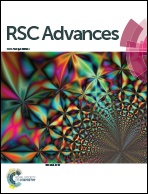A new probe based on rhodamine B and benzothiazole hydrazine for sensing hypochlorite in living cells and real water samples†
Abstract
We have developed a novel fluorescent probe (RBT) based on rhodamine B and benzothiazole hydrazine units for the detection of hypochlorite in living cells and real water samples with excellent selectivity and sensitivity. In the presence of hypochlorite in a mixture solution of MeCN–PBS (v/v = 3 : 7, pH = 7.4) at room temperature, the fluorescence intensity of RBT increased by 350 fold with the color change from colorless to red. The detection limit of the probe for hypochlorite is 1.06 × 10−9 M. Moreover, RBT was successfully used to image endogenous hypochlorite in living cells and detect hypochlorite in real water samples.


 Please wait while we load your content...
Please wait while we load your content...